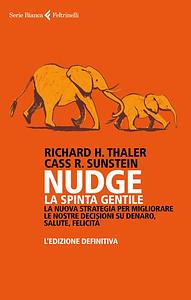Take a photo of a barcode or cover
Not sure I agree with everything, but provokes thought without bogging the reader down.
challenging
hopeful
informative
medium-paced
Pretty good book, overall. In the kind of interesting literature that's getting to the general public for the last 20 years on like behavioural economics, day-to-day incentives, probabilities kind of vibe. I like these books that tell you about how you think and how to understand your biases. However, some of them just take too long, and this is one of them. Like I get the point of the book by page 25, no need to write 345 pages, mate. 200 is enough, to show the examples of the concept/idea you are trying to show. Would still recommend if interested in that kind of literature.
hopeful
informative
inspiring
reflective
medium-paced
i would’ve enjoyed this more if this class didn’t nudge me towards wanting to never learn anything more about behavior. takeaway: save more tomorrow.
hopeful
informative
medium-paced
I can count on one hand the number of times, in my 49 years, I've stopped reading a book before I've finished it, but this COVID crisis has me realizing that life's too short. I'm not saying this book is bad, but rather, that it didn't meet my expectations in terms of the subject matter—for which I take partial responsibility. From the title, subtitle—"Improving decisions about health, wealth and happiness"—and even the synopsis on the back of the book—"[The authors] offer a new perspective on how to prevent the countless bad mistakes we make in our lives…"I believed this book to be about how we could train ourselves to make better decisions. Rather, it is about "choice architecture" and how "choice architects" can help us make better decisions. That's not to say that the examples used don't provide some insight into those bad choices—which, I guess, I can go correct on my own, now—but learning how the government's limited the number of choices I have for retirement investments can benefit me, when I have no control over what the government does, doesn't benefit me at all. I can see this book being super helpful to choice architects, but that seems like a super small audience & it's sold over 750,000 copies, so I must be missing something.
(february work book club) the finance section was much more practical and clear than the final third of the book ("freedom"), which included chapters on marriage and school choice, where the concept was less about markets and more about social/legal policies. how did we get from requiring mortgage lenders to provide side-by-side comparisons to suggesting two tiers of adult partnerships through the privatization of marriage?
funny
informative
reflective
medium-paced
I thought this book was going to be more studies and less “libertarian paternalism” suggestions. And it was a SLOG to get through- only plowed through thanks to late night nursing sessions with nothing else to do...



